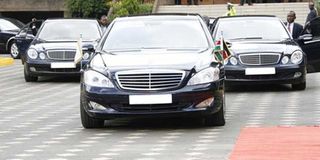Protection for VIPs cannot really be as casual as we would like to imagine

Part of President Mwai Kibaki's motorcade arrives at the Kenyatta International Conference Centre on January 4, 2009. PHOTO | FREDERICK ONYANGO | NATION MEDIA GROUP
What you need to know:
- Take it from me as someone who has been close to power — most VIPs are in the office before 6am and seldom get home before midnight.
- When a convoy of the President or his deputy or an opposition leader comes to a screeching halt with armed men alighting while vehicles are in motion, it sends a clear message to any potential attackers that the readiness level is elevated, that vigilance is high, and that threats would be dealt with ruthlessly.
Last week, I read with bemusement an article by columnist Macharia Gaitho, a journalist I greatly respect, on the issue of VIP protection.
I have laboured to debate this matter on social media, but Kenyans are so angry at the apparent disrespect by leaders who want to lord it over them that they have no time for reflection.
In the anchoring of a nation state, nothing is more important than the security of a people, except, maybe, the security of a VIP. But who is a VIP?
This is where I sense Kenyans are having a problem. When I served as an adviser in the previous regime, my permanent secretary and his boss oversaw a budget of Sh17 billion.
In a country where most people live on Sh85 a day, an amount like that in the hands of one person supervising a ministry makes him or her very important indeed. And there are attendant risks.
SITTING DUCKS
Think of what a ransom demand could mean if a Cabinet Secretary (CS) were kidnapped, not to mention the embarrassment it would cause the government, as well as the message it would send out to the world about security in Kenya.
I mean, if a person sitting in the Cabinet can be grabbed, what of a tourist walking barefoot on the beach at the Coast?
Of course, courtesy and decorum are expected. Powerful people must not be obnoxious. However, the first rule of VIP protection is for the potential target to be in constant motion. A tinted limousine stuck in traffic is a sitting duck.
I am well aware President Uhuru Kenyatta is a down-to-earth man. He has greatly reduced his entourage. But we mustn’t mistake safe passage and well-being for "coolness."
VIPs: NOT WHAT YOU THINK
I cannot tell you how easy it is for an RPG (rocket-propelled grenade) round to bring down a chopper and what madness such a simple action can throw an entire country into. Do people remember the downing of a plane, which killed a president, leading to the horrific Rwanda genocide in 1994?
I have read comments about how we are all the same and CSs need to learn to wake up early because they are equal to everybody else.
This statement sounds almost moronic. Nobody in Kenya has berated ministers, MPs, CSs, and senators more than myself. But take it from me as someone who has been close to power — most VIPs are in the office before 6am and seldom get home before midnight. Why?
Well, a typical day might unfold like this: Gym workout 5am, arrive at the office at 6am to receive briefings, breakfast meetings at 8am, Cabinet meeting at 9am, lunch with an ambassador at 12:30pm, Magadi to lay a foundation stone at 3pm.
By 5pm, he is back in the office for paperwork, followed by preparations for an appearance before Parliament at 7pm.
He finishes the job at 9pm, after which he meets colleagues and two senators for a drink and to compare notes at 10pm, and departure for home at 11:30pm.
FINDING A BALANCE
This is a typical day. The problem with our culture is that we seem to have a deep-seated inferiority complex and base sensitivity — that a four-by-four zooming past you is putting you down and showing you madharau.
When a convoy of the President or his deputy or an opposition leader comes to a screeching halt with armed men alighting while vehicles are in motion, it sends a clear message to any potential attackers that the readiness level is elevated, that vigilance is high, and that threats would be dealt with ruthlessly.
But if a CS is exposed and vulnerable, a would-be attacker would take this to be a reflection of how disorganised protection is at the very top.
I am all for shaking hands and slapping backs and eradicating opaqueness and corruption in this country. But when the President’s convoy passes me and I can see him clearly on Twitter with only a few cars in tow, I only shake my head in bewilderment.
I once counted 67 cars in President Kibaki’s entourage. We must not go that way either. Let’s find balance and be realistic. Give way to ambulances, police cars and VIPs. We know who they are.
Mr Ndolo is a former adviser and deputy chief of protocol in the defunct Office of the Vice-President.




